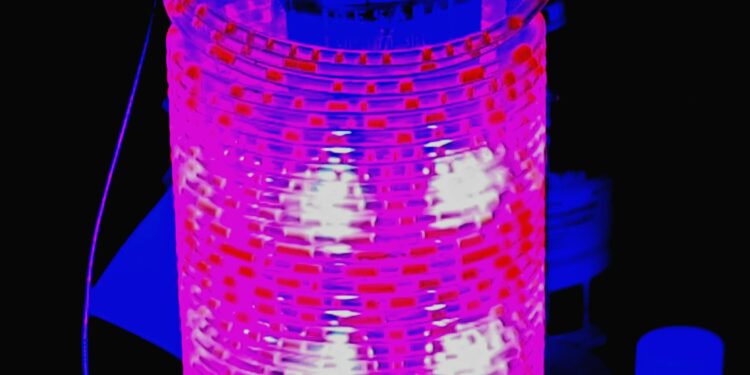Continuous photochemical reaction at the oil-water interface. Credit: Burkhard König, University of Regensburg
By forming chemical bonds between atoms, complex molecules such as those needed for medicines, plant protection products or high-performance materials are prepared using synthetic chemistry. Such synthesis reactions generally require organic solvents, metal catalysts, and reagents such as acids or alkalis. Not all auxiliary materials and solvents can always be recycled, resulting in waste.
Researchers from the University of Regensburg, led by Professor Burkhard König from the Institute of Organic Chemistry, now present a completely different way of synthesizing complex molecules: the molecules to be reacted are applied to a water surface , where they form a thin film. Irradiation with violet light triggers a reaction that binds the two reaction partners.
The new methodology exploits the formation of films of water-insoluble organic molecules on the water surface (like a film of oil on a puddle) to create ideal conditions for activation by light. The breadth of applications of the technology has been demonstrated in more than 160 examples, including the synthesis of drug precursors.
The slight reaction on the water surface now allows chemical synthesis without the use of organic solvents or other reaction additives. This makes chemical production more efficient and environmentally friendly. The results have now been published in Science.
The project has been underway for about two years. During this period, numerous experiments were carried out to develop and confirm the central discovery. Transferring the reaction to a flow reactor was a major breakthrough because the synthesis can be carried out continuously and larger quantities of product are also accessible. Spectroscopic measurements provided a better understanding of the molecular mechanism of the reaction.
In further work, the synthesis technology will now be applied to other reactions in order to obtain the widest possible range of applications in chemical production.
More information:
Ya-Ming Tian et al, Accelerated photochemical reactions at the oil-water interface exploiting melting point depression, Science (2024). DOI: 10.1126/science.adl3092
Provided by the University of Regensburg
Quote: A new synthesis method uses a light reaction on a water surface (February 16, 2024) retrieved on February 16, 2024 from
This document is subject to copyright. Apart from fair use for private study or research purposes, no part may be reproduced without written permission. The content is provided for information only.



